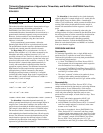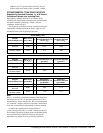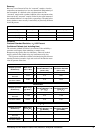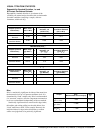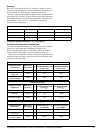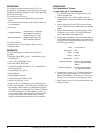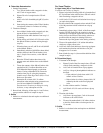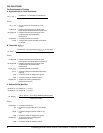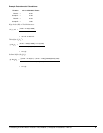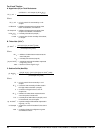
Processing KODAK Motion Picture Films, Module 3, Analytical Procedures • H24.03 7
B. Thiosulfate Determination
1. Sample Pretreatment:
a. To a 250-mL beaker with a magnetic stir-bar,
add 75 mL of reagent water.
b. Pipette 2.0 mL of sample into the 250-mL
beaker.
c. Add 5 mL of 6% formaldehyde (pH 3.9) to the
beaker.
d. Start stirring the contents of the 250-mL beaker,
set and start a timer for 2 minutes of stirring.
2. Titration of Sample:
a. Into a 400-mL beaker with a magnetic stir-bar,
pipette 40.0 mL of standardized 0.1 N
potassium iodate while the timer from step 1.d.
is running.
b. While stirring, add 10 mL of 2.0 N acetic acid to
the 400-mL beaker (continue stirring through
step 2e.).
c. When the timer goes off, add 25 mL of 0.6 M KI
to the 400-mL beaker.
d. Immediately after the 0.6 M KI has been added,
add the solution in the 250-mL beaker, from
step 1, Sample Pretreatment:, to the 400-mL
beaker.
e. Rinse the 250-mL beaker three times with
reagent water and add the rinses to the 400-mL
beaker.
f. Titrate the contents of the 400-mL beaker with
standardized 0.1 N sodium thiosulfate on an
E536 Metrohm Potentiograph or equivalent
titrator. If using a Metrohm E536, titrate the
solution from step 2e. using the parameters
found in step 5 of the Hypo Index (HI) or Total
Reductants procedure.
g. Determine the volume of 0.1 N sodium
thiosulfate at the end point using concentric arcs
(see Universal Method ULM-0003-01,
Potentiometric Titrations for Photoprocessing
Solutions, or any subsequent revision.
3. Run a blank, following all the steps in 1 and 2 above,
except omit the addition of sample in step 1b.
C. Sulfite
1. Sulfite is a calculated value and requires no additional
measurement.
For Visual Titration
A. Hypo Index (HI) or Total Reductants
Treatment and Titration of Sample:
1. Pipette (wipe before leveling) 40.0 mL of standardized
0.1 N potassium iodate solution into a 250-mL conical
flask containing a magnetic stir bar.
2. Add 10 mL of 2.0 N acetic acid solution from a tip-up
(or equivalent) pipette.
3. Stir the solution with a magnetic stirrer and add 25 mL
of 0.6 M potassium iodide solution from a tip-up
pipette.
4. Immediately pipette (wipe) 1.0 mL of the fixer sample
into the 250-mL flask while the solution is stirring
(hold the tip of the pipette against the wall of the flask
and as close to the surface of the stirring solution as
possible while the sample is draining but do not
immerse the tip of the pipette in the stirring solution).
5. Titrate with standardized 0.1 N sodium thiosulfate
solution to a light yellow color.
6. Add 5 mL of the starch indicator, from a tip-up pipette
and continue the titration until the blue color just
disappears for 15 seconds.
7. Run a blank (do steps 1–6, but omit the addition of the
sample in step 4).
B. Thiosulfate (Hypo)
1. Treatment of the Sample:
a. Pipette 2.0 mL of the fixer sample into a 250-mL
conical flask containing a magnetic stir bar.
b. Add 5 mL of formalin from a tip-up pipette.
c. Add 3 or 4 drops of phenolphthalein indicator to
the flask.
• If the solution is pink, titrate with 1.0 N
sulfuric acid to colorless.
• If the solution is colorless, titrate with 1.0 N
sodium hydroxide to the first light pink
color.
d. Let the solution stand for 2 minutes.
e. Add 10 mL of 2.0 N acetic acid from a tip-up
pipette.
2. Titration with Iodine:
a. Add, from a tip-up pipette, 5 mL of the starch
indicator to the conical flask.
b. Titrate with standardized 0.1 N iodine solution
to the first distinct blue color that persists for
15 seconds.
C. Sulfite
1. Sulfite is a calculated value and requires no additional
measurement.



